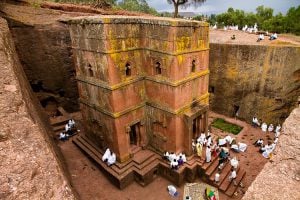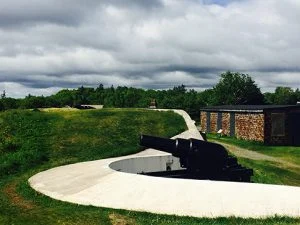
Travel
Ten curious facts about world heritage beyond Canada’s borders
Trivia nut Heather Yundt uncovers some of the lesser known, yet compelling curiosities of UNESCO's past and present global icons
- 1002 words
- 5 minutes
This article is over 5 years old and may contain outdated information.
Environment

A boreal forest area in Manitoba with strong First Nations ties is one step closer to being recognized as a UNESCO World Heritage Site.
Last year, there was an uproar when Pimachiowin Aki, Man. was not recommended for World Heritage Site designation, mainly because it had cultural and natural elements, but there isn’t a joint process that evaluates both cultural and natural criteria.
But in the last two weeks, the World Heritage Committee decided to reconsider the criteria for World Heritage Site status and change the processes so that both cultural and natural values can be considered when deciding whether a site merits recognition.

Mathew Jacobson, a boreal conservation officer with Pew Charitable Trusts, which supports the Pimachiowin Aki bid, believes this is positive movement towards getting the site on the World Heritage List.
“We — as western cultures — have traditionally separated human and human culture from the environment. I think that we’re all seeing the need to integrate those things if we’re going to make it into the future sustainably.”
When submitting a nomination to become a World Heritage Site, the bid must be based either on cultural criteria, such as Head-Smashed-In Buffalo Jump, Alta., or natural criteria, like Gros Morne National Park, N.L. There are two separate processes to evaluate whether the site meets the culture or nature site criteria.
Working with the governments of Manitoba, Ontario and Canada, the First Nations people of Pimachiowin Aki believe the 33,400-square-kilometre site should be recognized for both its cultural and natural aspects. The site is largely ecologically intact and several First Nations tribes have lived continuously on the land for more than 6,000 years.
“Having that large a landscape with that cultural custody of the land is a rare thing,” Jacobson says.

Nevertheless, the International Union for the Conservation of Nature (IUCN), which oversees the nature evaluation process, and the International Council of Monuments and Sites (ICOMOS), which addresses culture, did not recommend the nomination.
Of particular concern, the ICOMOS required the First Nations of Pimachiowin Aki declare this site unique and superior to other places associated with indigenous people around the world to meet the culture criteria. The Pimachiowin Aki First Nations refused.
Despite the IUCN and ICOMOS findings, the World Heritage Committee notes that Pimachiowin Aki was a mixed nomination that raised fundamental questions about “how the indissoluble bonds that exist in some places between culture and nature can be recognized on the World Heritage List.” The Committee says that evaluating the cultural and natural values of one property separately and the present wording of the criteria may contribute to the difficulty of evaluating this site.
“They recognized very clearly that there was a major problem within the evaluation process,” Jacobson says, adding this is something they are working to solve right now.
Jacobson says that while they are working on changing the criteria, they are also looking at ways to solve this particular situation so that no other communities have to go through the same problem.
“I’m exceedingly confident that the next time (this nomination) comes up, they’ll move past the existing hurdles,” Jacobson says. “Other people in other countries, First Nations in Canada and indigenous people around the world will have their particular landscapes recognized in ways not recognized before.”
Are you passionate about Canadian geography?
You can support Canadian Geographic in 3 ways:

Travel
Trivia nut Heather Yundt uncovers some of the lesser known, yet compelling curiosities of UNESCO's past and present global icons

History
Sites across Canada honouring the war

Environment
The 29,040-square-kilometre swath of boreal forest on the Manitoba-Ontario border is the first World Heritage Site in Canada to be recognized for both its cultural and natural significance

Environment
David Boyd, a Canadian environmental lawyer and UN Special Rapporteur on Human Rights and the Environment, reveals how recognizing the human right to a healthy environment can spur positive action for the planet